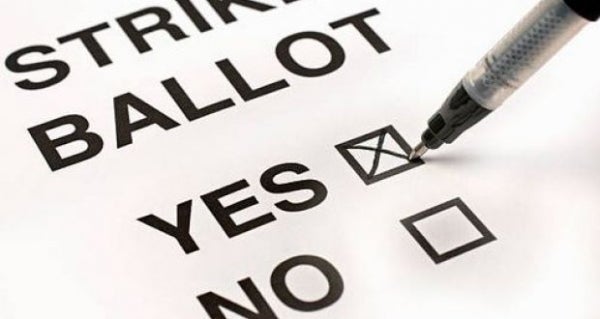
1. What is conciliation?
Conciliation is a way for a third party to help with negotiations and to identify the terms of a possible settlement. Conciliation is required by the Trade Union Act before a strike / lockout position becomes legal. A conciliator is a government-appointed third party that assists the two sides in clarifying their positions to each other, but has no power to impose a settlement.
2. What is a lockout?
A lockout occurs when the Employer denies employees access to the workplace and stops paying them in order to exert pressure on the union and its members to settle on the Employer’s terms. Lockouts have been rare in the university sector in Canada but it is a legal option open to our Employer. The Employer can lockout its employees 15 days after a conciliator files their report when the two parties cannot reach a tentative agreement. Once in a legal lockout position, the employer can impose new terms and conditions of work.
3. What is a strike?
A strike is when employees stop working to pressure the Employer to agree to their demands in collective bargaining.
Employees on strike receive strike pay from their union, while the Employer is not paying them.
4. What is a “strike mandate”?
A strike mandate means that CUPE 3912 members authorize a strike if the Employer refuses to agree to a fair collective agreement.
A strong strike mandate is the best way to avoid a strike, because it shows the Employer that:
- we are serious about our demands for fair working conditions, and
- we are unified and willing to take action to protect our rights, if necessary.
A strike mandate is also necessary even when there’s a lockout to preserve the Union’s ability to resist the Employer’s impositions of unfair terms and conditions of work.
5. What is a “strike vote”?
A strike vote is the process for members to decide whether to approve a strike mandate.
6. Who can vote?
CUPE 3912 members who are employed in the current term are eligible to vote on a strike mandate at each of the universities where they are employed.
- part-time academics at Dal, SMU and MSVU, including clinical instructors and lab demonstrators;
- a teaching assistant, a marker, or a demonstrator at Dal; or
- a teaching assistant, research assistant, or an independent course appointee at NSCAD; or
- a teaching assistant at SMU.
7. Why should I vote?
A strong strike mandate is an important tool for making the Employer agree to a fair collective agreement.
The more members vote Yes on a strike vote:
- the more likely the Employer is to agree to a fair collective agreement; and
- the less likely that we actually have to go on strike to protect our rights.
Members who do not vote are counted as voting against a strike mandate under Nova Scotia legislation.
8. How can I vote?
Voting will be online. Voters with an active contract will receive an email with an invitation to vote. After you submit a ballot, the results are encrypted and kept anonymous.
9. Who do I contact if I encounter voting issues?
Please contact the CUPE 3912 voting@cupe3912.ca.
10. When will the strike votes be held?
Please check Bargaining Updates to see the latest updates from your negotiations team.
- Dal: The strike vote will start August 12, 2025 after the general membership meeting.
- SMU PT Faculty: TBA
- SMU TAs: TBA
- MSVU: September 12-14, 2025
- NSCAD: TBA
11. When is a strike vote successful?
To secure a strike mandate, more than 50% of all current employees must vote Yes.
- The more members vote Yes, the stronger the strike mandate.
- Not voting is counted as voting No (under Nova Scotia law).
12. When would a strike actually be held?
- Dal: TBD
- SMU PT Faculty: TBD
- SMU TAs: TBD
- MSVU: TBD
- NSCAD: TBD
11. What happens if there is a strike?
If there is a strike, members of CUPE 3912 at that university will not be doing any of their usual work. This means that classes taught by members of CUPE 3912 (Part-Time Faculty at Dal, MSVU and SMU, or ICAs at NSCAD) will be cancelled, along with office hours and other normal teaching activities performed by them or by TAs at Dal, SMU and NSCAD.
12. Will I know in advance if there is a strike?
Yes. The law requires that a 48 hours notice is given. If CUPE 3912 has to set a strike deadline, we will give as much notice as we can.
13. How can I pay my bills if I go on strike?
If a strike is called or the Employer has locked out members, the Employer will no longer pay us. CUPE 3912 members actively on strike receive strike pay.
- $350/week (non-taxable) initially, and higher if the strike is longer.
- Members must be current employees and perform 20 hours per week of strike duties to receive strike pay. Accommodations may be made.
- An additional top up of strike pay will be provided to every member performing strike duties. The exact amount will be determined at a later date.
14. Will going on strike affect my student status?
No. Your student status does not depend on your employment.
15. What happens with students’ grades during and after a strike?
While the strike is ongoing, you do not submit any grades. Once the strike is over, you will be submitting the grades and the Employer will have to pay for the work that you perform.
16. Who can I talk to if I have questions? Where can I get more information?
Please direct your questions to your relevant VP can also check our news updates or social media for public updates.